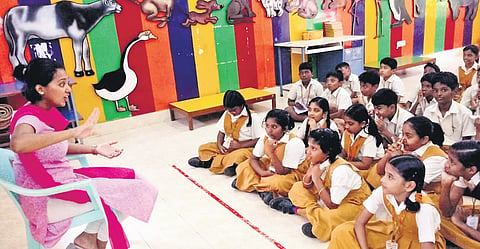

CHENNAI: In Hans Christian Andersen’s timeless classic The Ugly Duckling, the protagonist faces relentless ridicule from his peers and even his own family due to his different appearance. Finally, after a period of struggle and self-discovery, the duckling undergoes a remarkable transformation, realising that he is not a duck at all, but a swan. Even though the story is something that is told as kids, it stays with you as an adult. For storyteller Sukanya Umesh aka Suki, The Ugly Duckling was her first favourite story and it still remains that. When most people limit their understanding of the world of storytelling as something for kids, this World Storytelling Day, the city-based storyteller explains how it is an art for everyone and how it needs more recognition, especially as a profession.
Exploring the world of stories
Since her childhood, Suki has been a voracious reader. “My parents started reading to me when I was almost six months old. I had more fictional friends than real friends growing up. My mother used to tell me the story of The Ugly Duckling. I was also a fan of the Harry Potter series, Sherlock Holmes, books by Neil Gaiman, Terry Pratchett, Philip Pullman, and Jonathan Strauss,” says Suki.
In 2018, she became a storyteller under the Book Lovers Program For Schools, a sub-brand of Multistory Learning Private Limited. “The programme intended to make children interested in picking up the books and reading. I used to do storytelling for kids from LKG to class 12. In a day there will be almost eight hours of storytelling,” shares Suki.
She is also a trained Carnatic singer and Bharatanatyam dancer. Her experience of working as a theatre artiste also helped her build storytelling skills. Explaining how she used to pick books and curate the sessions for students, Suki says, “There were certain guidelines which were given to me by the organisation that helped me. According to that, kids of a certain age should know certain words by that particular time. So I would pick books according to that. For young kids, I wouldn’t opt for pretend play where they use their imagination more as they are still exploring the world around them. I need to give them a sense of what is happening and help them get a better sense of everything.”
The artiste also says that she doesn’t share moral stories as she believes that children innately understand concepts like morality and it is important for them to shape their perspectives. Asserting that guidance is necessary, she feels that feeding them strict moral values can be forceful and they should figure out what is wrong and right. She says, “There is a definite understanding in the child’s mind, even though there are problematic instances like body shaming in certain stories. I feel like in the stories of Roald Dahl, the problems come in their actions rather than their physical appearance. So I don’t alter the source material as it is sacred for me.”
For older age groups, she encourages them to add more fantasy and imagination. Explaining how she performs and alters her style for different age groups. “I figure out what kind of audience that I am talking to. I select the themes accordingly. I alter the already existing stories and perform them in a way that is entertaining and informative for people. While performing for students, orchestrating a story is much easier as they are interactive. But for adults, they won’t participate in the story, so you have to make some changes,” says Suki.
Impactful tool
As she delves further into the realm of storytelling, she talks about the need to quash the prejudices on concepts of family, LGBTQIA+, and sexual wellness.
She says, “More than the children, the parents should read and understand how to present these topics to kids from a young age. Storytelling has a huge impact on everybody’s life. The documentaries about Gaza inform us about the situation there. Movies like Poor Things creatively explain how difficult it is to be a woman. By understanding these larger forms of storytelling, we can also reflect on how we narrate and understand everything.”
Apart from telling stories, Suki also conducts workshops for teachers to train them in the field of storytelling. “In the workshops, I start with explaining story structure and make them understand how every person is a storyteller in their own way. Every person has a unique way of telling stories or narrating real-life incidents. Some people are a lot more physical with their stories. Some others are greater with altering voice and expression. The idea of these workshops is always to make people understand the skills for storytelling and better it,” she says.
Storytelling is a very powerful tool, especially when you tell impactful stories. Sharing her inspirations in the field, Suki says, “I admire Janaki Sabesh, who runs Golpo Tales, and who I credit with opening my eyes to “storytelling” as a performance art, and Bhagirathy Samudram, who pulled me into being a storyteller. I am what I am, as a storyteller, because of these two women, apart from all the other colleagues I’ve had over the years.”
Suki is also a writer and has co-authored a children’s storybook titled Lola and Chacko published by Ms Moochi Books. Sharing her aspirations, Suki winds up saying, “I want to be able to publish a lot more stories and find ways to make storytelling more interactive. Starting a YouTube channel for telling kids stories is also in the cards. I am open to doing storytelling performances and workshops for schools, events, festivals, etc. The more exposure the craft gets, the better for everyone. I wish people realised the importance of storytelling and took it as a more serious profession. Movie production companies can hire storytellers to read the script and present it for them, there are plenty of avenues like that.”
For updates, follow Sukanya on Instagram @suki.kooky